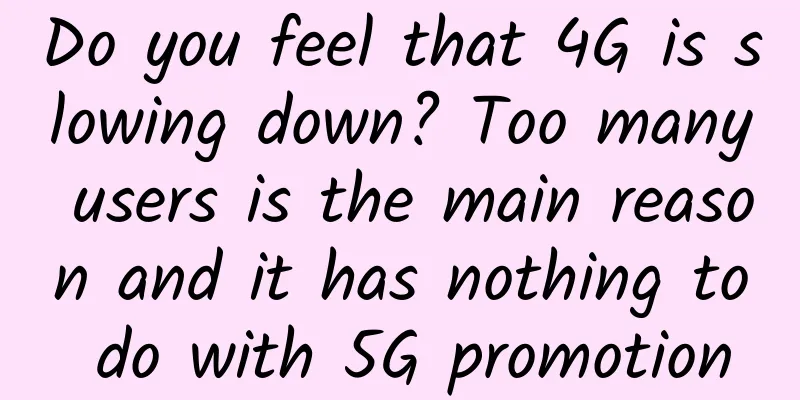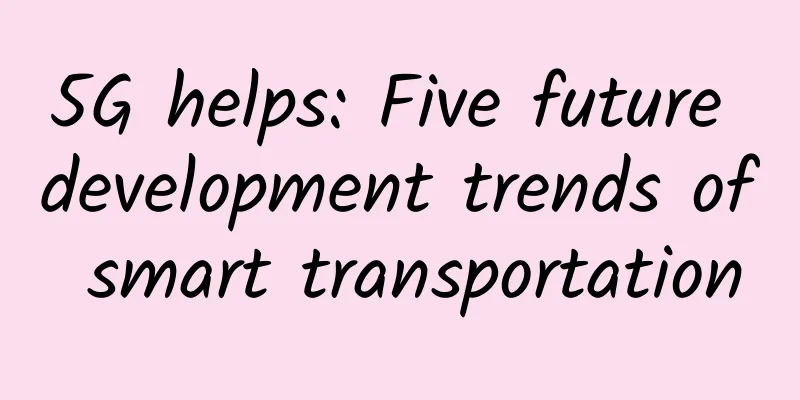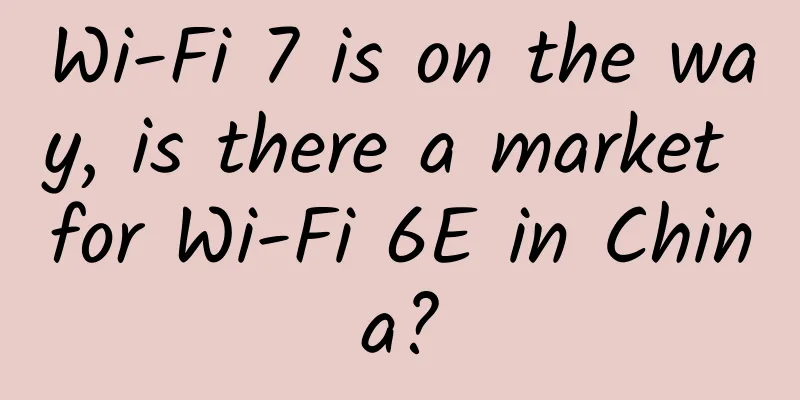Do you feel that 4G is slowing down? Too many users is the main reason and it has nothing to do with 5G promotion

|
After operators launched the "unlimited data" package, people are no longer as "cautious" as before when using mobile data. In the subway and on the bus, "head-down tribe" holding their phones to watch popular online dramas and small videos can be seen almost everywhere. When mobile data is no longer so precious, new doubts have emerged. Recently, some netizens have reported that the 4G network speed is getting slower and slower. There are even rumors that the slowdown in 4G network speed may be related to the construction and promotion of 5G. For a while, "4G speed reduction" became a hot topic on the Internet. Recently, Wen Ku, spokesman of the Ministry of Industry and Information Technology and director of the Information and Communications Development Department, pointed out in a collective interview with the media that the Ministry of Industry and Information Technology has never and will not ask relevant operators to reduce or limit the 4G network speed. The Ministry of Industry and Information Technology will further strengthen the supervision of operators and effectively safeguard the legitimate rights and interests of consumers. What is the 4G network speed like? Relevant online rumors said, "According to actual measurements by netizens, the theoretical 4G network speed should be 100Mbps, equivalent to 12.5M/s, but the actual speed is only 1.51M/s, a full 11M/s short." In the opinion of Yan Huaizhi, director of the Institute of Computer Network and Countermeasures Technology at Beijing Institute of Technology, the number of samples tested by netizens is limited. To understand the actual situation of the overall 4G network speed, data from a large range of monitoring samples is needed. Previously, the Ministry of Industry and Information Technology guided the China Academy of Information and Communications Technology to build a monitoring platform covering 31 provinces (autonomous regions and municipalities) across the country, and monitored 4G network speeds through technical means. The number of monitoring samples each quarter has currently exceeded 71 million. Wen Ku introduced that monitoring data from the above-mentioned platforms showed that the national average 4G download speed has continued to increase steadily in recent years, reaching 23.78Mbps in July 2019, and there has been no significant decline in speed overall. "Objectively speaking, the 4G network speed has not slowed down, and the network speed has been increasing." Wang Xiaofei, a professor at the School of Computer Science and Technology of Tianjin University, said in an interview with Science and Technology Daily. Why do users feel that the Internet speed is slowing down? Official monitoring data shows that the overall 4G network speed has not dropped significantly, so why do some users report slow network speeds? "This is related to the unlimited data packages generally launched by operators. Under the new rate and data traffic standards, everyone uses data freely. Some people do not use it even if they have WiFi at home, which has caused network congestion to a certain extent." said Zhang Chi, a doctor of communications and former associate professor at the Army Engineering University. According to statistics, the average mobile Internet access traffic (DOU) per household in 2018 was 4.42GB, while in July this year, the DOU reached 8.33GB, an increase of nearly 100%. "Users' demand for traffic has increased sharply, and the speed of base station construction has been difficult to keep up, so it is inevitable that the Internet speed has slowed down," said Zhang Chi. Similarly, Yan Huaizhi also believes that the increasing demand for Internet access among netizens and the increase in both the total number of netizens and the traffic demand of individual users have brought greater traffic pressure to the existing 4G network. The competition for concurrent network service requests has brought greater pressure to the network, affecting the user experience to a certain extent. Wang Xiaofei also expressed a similar view. He pointed out that on the one hand, everyone uses mobile phones to watch live broadcasts and videos, but the bandwidth and processing power of 4G networks are limited. If many people are online at the same time, the network speed may slow down. On the other hand, as mobile apps are constantly updated and service quality improves, the amount of data transmitted is also increasing, and there is a greater demand for traffic and bandwidth. For example, some short video apps used to provide lower-definition videos and transmit less data; but now they can provide higher-definition videos, and watching these videos requires more traffic and greater bandwidth. "Therefore, when users feel that the Internet speed is slowing down, it may be a relative slowdown, not a real decrease in speed," Wang Xiaofei analyzed. Is it related to 5G construction and promotion? Some people believe that operators have invested all their money in 5G construction and stopped building 4G, so 4G network speeds are getting slower and slower. In response, Zhang Chi said that this is not the case. "As far as I know, the three major operators also want to improve the 4G network speed very much, especially in the prosperous areas of Beijing, Shanghai, Guangzhou and Shenzhen. But they encountered some technical limitations in the actual construction." Zhang Chi introduced that the construction of 4G base stations has certain standards, and its bandwidth and coverage are limited. The current situation is close to the limit, and any further improvement will face technical bottlenecks. In addition, there are rumors that the 4G network speed has been reduced in order to "promote 5G." In Wang Xiaofei's view, this view is suspected of hype. He further analyzed that, on the one hand, operators have not yet launched a variety of 5G packages on a large scale, so there is no possibility of deliberately lowering the 4G rate to sell 5G packages. On the other hand, industry insiders revealed that 5G package charges are relatively expensive and are mainly aimed at high-end users with greater communication needs. Therefore, it is impossible to lower the entire 4G rate for a small number of high-end users. Wen Ku also pointed out in a collective interview with the media that at present, the construction and development of 5G networks has just started, and it will take several years to build a 5G network covering the whole country. As an important part of the mobile communication network, 4G will coexist with the 5G network for a long time. There is no need to dismantle 4G or limit the 4G rate after building 5G. While the Ministry of Industry and Information Technology is using the high speed and large bandwidth of 5G to divert 4G network traffic, it is also continuing to do a good job in the operation and maintenance and transformation of 4G, taking a two-pronged approach to ensure user experience. How to improve 4G Internet experience "Although there are many factors that lead to poor user experience, from the perspective of operators, the core goal should be to provide users with better services." Yan Huaizhi pointed out that while operators are accelerating the layout of 5G, they must also safeguard the rights and interests of existing 4G users and provide 4G users with services without speed reduction. Wen Ku also stated in a group interview with the media that the Ministry of Industry and Information Technology will take multiple approaches to promote the expansion and upgrading of mobile networks so that users can truly feel faster and more stable network speeds. On the one hand, we will continue to promote the work of speeding up and reducing network fees. In May 2019, the Ministry of Industry and Information Technology and the State-owned Assets Supervision and Administration Commission issued the Notice on Carrying out the 2019 Special Action to Deepen the Promotion of Broadband Network Speed-up and Fee Reduction and Support High-quality Economic Development, further improving 4G network coverage in traffic hotspots and areas with weak coverage such as subways, schools, hospitals, and large venues. We will deepen the pilot of universal telecommunications services, support the construction of 4G base stations in rural and remote areas, and achieve 4G coverage of 98% of administrative villages across the country ahead of schedule. As of July 2019, the scale of 4G base stations in my country has exceeded 4.56 million, and the scale of the network ranks first in the world. At the same time, operators should be guided to actively expand and upgrade their networks. Faced with the huge pressure on 4G networks brought by the rapid development of mobile Internet services, operators should actively promote the application of new technologies and increase network capacity by introducing new technologies such as carrier aggregation and 3D-MIM0. At the same time, the content distribution network (CDN) should be extended to the edge of the network to achieve local access to Internet information sources and improve users' Internet experience. |
<<: All in one article: 20 industries that 5G can change
>>: Can 5G extend the life of HTC’s desperate VR business?
Recommend
Top 10 edge computing vendors to watch
Due to advances in the Internet of Things (IoT) a...
Global Private 5G Network, Taking Enterprise to the Next Level!
A recent analysis by Frost & Sullivan shows t...
F5G, not so mysterious
[[342086]] This article is reprinted from the WeC...
What does a 5G network look like? A simple article to understand
[[311978]] Whether it is 2G, 3G, 4G or 5G, the mo...
RAKsmart server flash sale starts from $30/month, 1Gbps unlimited traffic server starts from $99/month
Continuing to share RAKsmart's April promotio...
Huawei Cloud's Zheng Yelai: Diversified computing power drives application innovation
As science and technology develops at an increasi...
When 5G network solves the fee issue, will your phone still use WiFi?
Recently, British media reported that Ofcom's...
How to use the Shodan search engine to diagnose vulnerabilities?
The Shodan search engine allows users to find spe...
Various abnormal phenomena and analysis from TCP protocol to TCP communication (Part 1)
Many people always think that learning TCP/IP pro...
Huawei Cloud DevRun Summit: Login 2020 will be held tomorrow, and these friends are here
Xi'erqi subway station is so cool these days!...
6 steps to effective real-time monitoring across hybrid IT
For data center operations, it can be difficult t...
5G Trend Prediction in 2021
More than a year after 5G was launched for commer...
It is urgent for operators to improve network operation and maintenance
Communication networks are the underlying infrast...
PhotonVPS: NVMe hard disk VPS 20% off from $4/month, 2GB/30GB/2TB/Los Angeles and other data centers
It has been more than a year since I shared infor...
Detailed roadmap for 5G standards
[[429204]] While 5G has been a hot topic for year...









